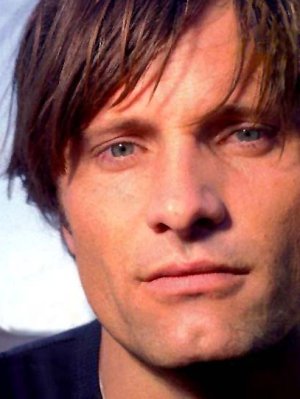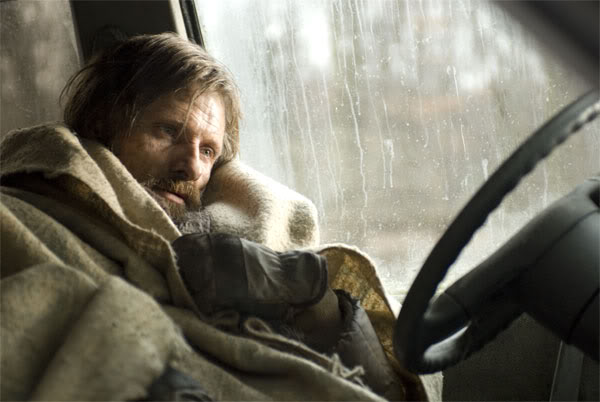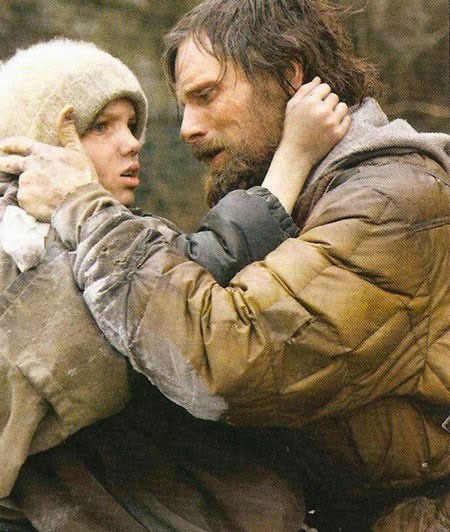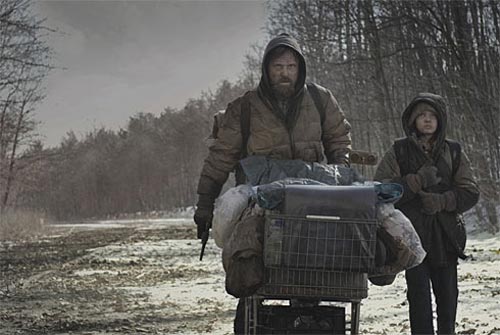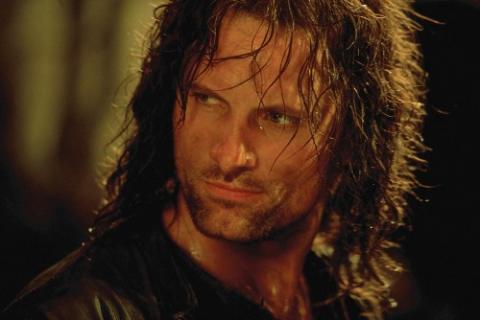
I just saw a screening of The Road, and I have to say, I haven't been this affected by a film in a very long time. Based on the best-selling book by Cormac McCarthy, The Road is the story of a man and his son (they are not named in the book or the film) trying to survive in a post-apocalyptic landscape. But more than that, it's a story about humanity and what the human spirit can survive.
I got a chance to speak to star Viggo Mortensen about his role in the film. It was an intense role for the actor, requiring shooting in the cold, intense emotional honesty and losing a massive amount of weight. When I entered the interview room, I noticed a mate gourd on the table. It's the national drink of Argentina, and when I asked him about it, Mortensen told me he started drinking it there. “It gives you a lot of energy, but it doesn't have a lot of caffeine. You don't crash afterwards. It doesn't make you jittery. It just keeps you going. It's supposed to be good for digestion too.” We launched right into the interview from there.
You were seriously skinny during this film...
I drank a lot of it (mate) on set. It was just to have energy too.
That must have been really hard on your body. What kind of physical toll did it take on you?
I was really tired. It took me a long time to get weight back. I was surprised at that. I thought, oh, I'll just start eating again, but it took me a while, actually. I found that I slept a lot. [laughs] That was understandable. I really slept a lot.
I wanted to ask you about working with Kodi Smit-McPhee ... working with a young kid. Did you have any reservations going in?
Yeah. He was great. And that was a big concern, obviously. Going in, once I said yes, it was really flattering to be asked to play the role. I know a lot of other guys would probably like to play it. And then I thought, now what? This always happens. You get a part, and then it's like, oh shit, now I have to do it. [Laughs] I always have to go through that process of getting my confidence that I know something about the character, and until I do, I'm going to be worried. That's just the way it is. But in this case, much more, because I realized that to do it right, I had to be really honest and emotional, somehow different that I'd done before ... that I'd always have to have some kind of real turmoil going on, close to the surface at all times. [Laughs] And I thought, that's going to be hard to do. And especially because I'm so dependent on The Boy. And that's really not going to work unless The Boy is great. Has a great presence and range, and is smart. You can't just have a precocious kid who does a few scenes in the movie and is lucky if he gives as many takes as you have to. Use the camera to shoot around him if you can. Really going through stuff.
I read with the last four kids, including Kodi, and they were all good. But he had that thing. He definitely had that something in his eyes that, as much as he was kind of a goof ball in between takes and all that, when it came down to the work, there was something in him that was very kind of melancholy and serious. A wisdom, really. He, in fact, understood the book, he could talk about the book, he could make adjustments on the fly if something happened. If there was an accident during a take, he could use it. Or the fact that he was really cold sometimes and it made him feel a certain way. He would tough it out and realize it was helping him be more fragile, and he would go there. Which wore him out. He was beat at the end of every day.
I can imagine that was exhausting.
Yeah, we were pretty tired, I have to say. [Laughs] Which helped. It looked real. We helped the makeup department out. Which was very good, by the way.
It was. I did makeup for many years, so I particularly appreciated that. You didn't look like yourself. You really looked like your character.
And Robert Duvall's was incredible!
He was unrecognizable! You know, we were talking to the director (John Hillcoat) during the round table interviews, and he was talking about having to stop during takes because of birds flying over, and planes ... how much harder did this make it on the actors?
You know, because we were in remote areas, and we were lucky with the weather ... it was mostly crappy and cold and wet and snowy ... we didn't have to stop that much. It was only towards the end of the shoot when we were getting close to Spring and just hoping that it would still be rainy that we had to then start running around tearing up bits of green grass or leaves, or avoiding them in the shot. And then they had to cover them with dust. Do whatever they had to do. And then birds in the Springtime. That did become a bit of a nightmare. And the sea. You would see seagulls flying by from time to time. But it didn't slow us down that much. We were lucky. We could have gotten into a lot of trouble if the weather had been nicer.
So funny to wish for bad weather.
I know. But we constantly did. It was really valuable. As an actor it was really valuable to be in those environments. For it to be cold and stuff. It just felt real. And it upped the ante, you know? It was like a measuring stick for me. Like, if this looks that real and is that gritty, and if the landscape is that much of an open wound, then I have to be at that level and The Boy has to be. And together we have to get there, so we can't be less real than our surroundings. So in many ways it was great. Plus, it just wasn't a big budget movie. We couldn't really do all that special effects stuff. Do it afterwards. Do it green screen and stuff.
After the film last night, we were all talking about how, after watching something like this, you aren't the same person you were before the viewing. So I wanted to ask you, after working on something this intense, how does it affect you? I know you do a lot of art, photography and poetry. Have you done anything since then?
I took some photographs, but not as many as usual, just because I was consumed by what I was doing, and tired by it, and I didn't want to be distracted. It was kind of a fragile thing, emotionally, and because I felt very protective. The Boy was my responsibility, I felt, more than anyone's. Kodi was. And so that kind of took my ... I never really wanted to be outside of that. But I did, in the evenings, write a lot. I wrote a lot of poems that had to do with things and feelings that came up.
I would think that this would affect your art, in whatever form. It's really sort of a “changing” film.
Yeah, and I think that's true. And I'm glad you said that. I've seen that in the faces of people that have been to screenings and Q&A sessions ... the look on many faces. You can see that they've been crying, or they're still maybe, a little bit. But they're smiling too. It's that bittersweet kind of feeling. You know, it's strangely uplifting, but in an honest way. It's based on some suffering, you know?
That's how I felt about the story. That's how I felt about telling it. That's how I felt about watching it. To see that and to hear people say, 'I just want to call my mom. Call somebody. I'm so glad about what I do have, even though I'm complaining that I can't pay rent' or something. And it's not just, oh, look how bad they have it. It's just a question of appreciating life. Because nobody really knows how long they're going to be around or when they have to leave or how they have to leave. You know? Which people don't want to think about. But when you're forced to think about that like you are in this story, then you start to ask yourself, what's the deal? What's good about me? What am I going to miss? Well, it's just me being here with you. Me being with my son. Any movie that makes you appreciate those sorts of things a little bit more is doing something right. And you don't get that transformative feeling with from that many movies, I don't think.
You mentioned earlier in the day that you were going to be doing another play. Seeing the transformative affect of this film in the Q&A's and screenings, and getting people's immediate reactions ... is that something you've missed in all the years you've been away from the stage?
Maybe. I don't know. I get it once in a while over the years during poetry readings, because there's that immediate reaction, and sometimes it guides me. Sometimes I have to rewrite the poem, and take things out because sometimes I understand that, I mean, it's a different medium, the spoken word, and reading it. But you can tell sometimes in reading it that some things are not necessary. That less is more in certain areas, and so forth. Or that something needs more clarification. But yeah. I mean, I'm scared of it because I haven't done it in a long time and because it's just different. And there's other things, other challenges, and the material's kind of tough, to be honest with you. So it is scary. In the same sense that The Road was scary. I realized once I committed to it that it was going to be a tall order. But those are the things you learn from. Even if they don't quite work out, you still learn something.
And you're doing it in Madrid. A very different audience.
Yeah, we'll see. I'm too scared to think about it right now! [Laughs] And what makes me really nervous is that I keep going back and forth to do stuff for The Road and whatnot, that the rehearsal process is broken up into pieces rather than one long ... and then at the end of a day like today, I'll look at the script and I'm fried ... it's not the same thing, so I don't really ... I won't get much done until I get back there. Which is kind of stressful.
I used to do a lot of theater. I understand.
Yeah, you want to be in that world and not be taken out of it.
I always wonder how stressful it is to be doing press for one thing and trying to work on another project.
It's not easy. It's not a good thing. But I've had to do that before. I had to do that a couple of different times. And the last time was when I accepted this role. So I was shooting, promoting another movie, and talking on the phone with (director) John Hillcoat, who I didn't meet until I went to Pittsburgh. And having to make a decision. I said, 'I'm overwhelmed right now'. I said to my agent, 'I'm not doing that movie.' he said, 'It's The Road and it's Cormac McCarthy ... ' I mean, I'm glad I did it but it was a lot.
Is this where the famous interview that had you retiring and never doing another movie again came from?
That was some time last year. But I didn't really say I was not doing anything. I just said I didn't have anything lined up right now.
Yeah, it didn't sound like you were saying that. But it was everywhere.
Yeah, and I don't know where they got that. I've been answering that question ever since. Which is weird. And they said, 'Oh, you're not going to be like Brett Favre, the football player. You're going to keep quitting and coming back?' [Laughs] And I said, 'No I haven't done that.'
It's the question in every interview, right? 'What do you have lined up?'
Yeah, and you're supposed to say I've got twenty projects lined up.
And maybe you just want to go on vacation.
Yeah.
Some of my Twitter followers have questions for you.
So what is Twitter? How is it different than Facebook?
It's pretty much just a stream of status updates. In 140 characters.
Ah, I see. It's really. It's short.
So they all want to know if you're going to do the second Hobbit film.
I don't know. It's not for lack of interest. I just haven't heard anything else other than rumors, like everyone else, that they may do something ... a linking story between The Hobbit and Lord of the Rings. Between those two stories, there's about sixty of our years that go by, which is nothing for my character, so he's certainly alive and you could have a bridge story if they did that, but I have no idea if they're going to do that. I just heard rumors, so I don't know. But it would be interesting.
So you'd like to revisit that character?
Yeah, I'd rather do it than watch someone else do it.
I don't think anyone wants to watch anyone else do it.
Well, that's cool. But you know, they may want to bring back, if they do that, they may find a way to bring back, you know, maybe a few, several of the characters from the trilogy, just because audiences may find that interesting. If you do it in a legitimate way.
I hope that they do. And I think the heroic journey of it all ... I was reminded of Lord of the Rings while watching The Road. I know it's a very different setting ... no elves ... but it's a heroic journey for both characters. Turns out a little differently.
Yeah. But still, there is something ... Aragon just comes out and says, 'There is always hope.' But that is what The Man is kind of doing by just insisting on stubbornly just keeping on going. He loses sight of the idea of hope. But then, his actions are saying that. He loses his way and behaves badly, and has to be reminded by The Boy.
That was a great moment.
Really great.
It was really interesting to watch and try to decide whether he still had hope or if it was all to protect his kid. And what he was protecting him for. So did you have an idea in your head of what the apocalypse actually was? It's never made clear in the books or the film.
Yeah, I had some ideas, but in the end, you know, just as for the character, once the grid is done, once there's no TV or phone or internet, once your neighbors start dying or killing themselves or being slaughtered, your world gets closed down. Just as, say right now, there was a giant massive earthquake or tidal wave. We wouldn't be talking to anybody. We wouldn't know, is this happening to everybody all over the world? What's going on? We hear there's war. Is there war? What's going on? That's what happens. Everything becomes very immediate. It's your street. It's closing those windows. Pretty quickly you don't know, and you don't really care what's going on beyond a couple miles. And somebody shows up and says, 'Hey, you guys can go about a hundred and eighty eight miles that way, and you're going to find some food and there's some nice people.' Well, then you go. But you don't know, and you're just trying to find out how to stay alive. And it so quickly becomes that, that it's kind of irrelevant. I can understand why Cormac McCarthy didn't explain it in interviews, because it's not relevant. It's just a way of stripping everything away from us.
I really liked that, actually. Because you're not concentrating on the actual event. And it's ten years later. I also wondered if your character actually believes there is something worth traveling for at the coast. (MILD SPOILERS)
I think he has serious doubts about it. And was trying to keep The Boy's hopes up and maybe his own. But I think he was pessimistic about it. You know? Even right before they get to it. The Boy says, 'Is it still blue?' 'I don't know. It used to be.' But he's not shocked like The Boy is. He's disappointed. He's really disappointed and that he's let The Boy down. But what's interesting about that and really beautiful, is that it's about the journey and not the destination. Because that thing that they're hopeful about and that they're trying to get to, when they go south and go to the sea, when we get to the coast it's going to be warmer and there's going to be food. There's going to be sustenance, there's going to be shelter. There's going to be good people. There's going to be kids. I don't know what. It's going to be better. Everything depends on reaching the coast. And we get there and it's just as bad or worse. It's just as cold. There's just as little food. Just as little shelter or safety, and you can just quit and not even reflect on that, or you can just realize that the thing we kept looking for, which, in fact, we can be grateful for that illusion, because it got us there. It drove us on. It was just that. An illusion. What we're looking for, we always had and still have it. It's each other. Our both being alive. And taking care of each other. That's the thing. That's the most important. You know what I mean.
Yeah.
Without being sappy, that's what the story is about. It's hard earned answer or lesson, because it's really sincere and honest and without gimmicks. That's why I think people take so much from it and think about their families, and, 'Oh I'll go call my friend.' It makes you think about and appreciate what you do have. Which is always good. I mean, any movie or story that makes you accept and be grateful for something about your life is doing something right.
I know they're wrapping us up now, so I'm going to ask you a not-so-deep question. How lovely was it to shower at the end of each day? You guys were so dirty!
It was great! It was warm. I would take a bath. I would take a shower and then I would get in the bath for a little while and soak. I loved it. It's also because we'd been cold and wet all day, generally. That was great. But after a while we'd get so dirty that I'd get really clean, except for my nails.
Yeah, there isn't a lot you can do about that one.
After a while it was like, that's just the way I looked. [laughs] I'd go to the store, and they'd go 'Eww'. And I'd go, 'No! I just took a bath, really!
The Road will be released Wednesday, November 25th.
